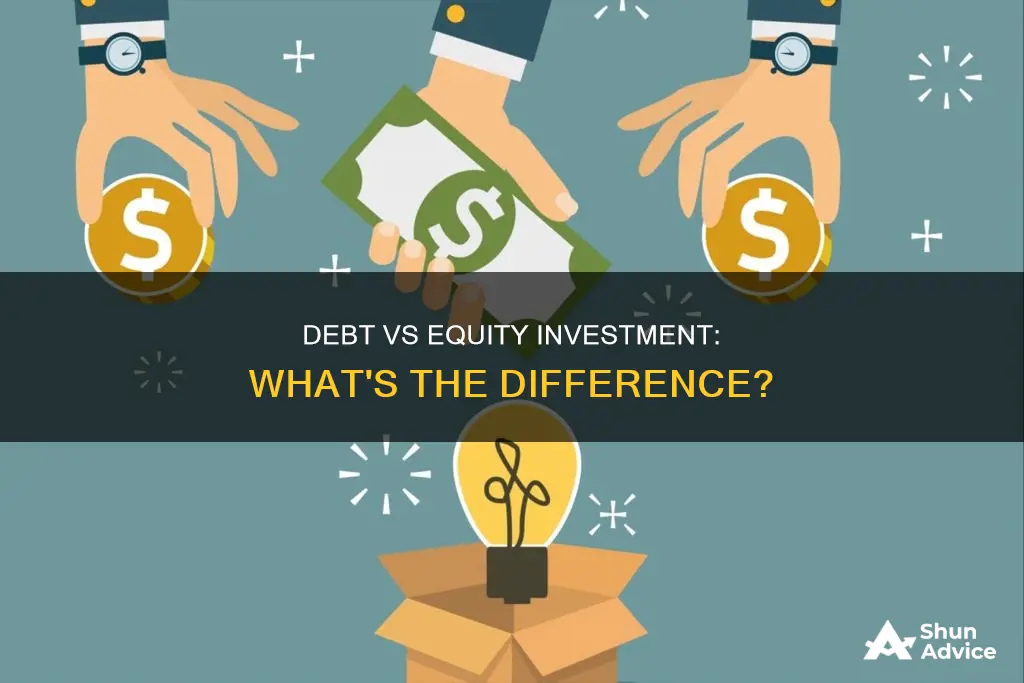
Debt and equity are two broad categories of investments. The debt market is where loan assets are bought and sold, while the equity market is where stocks are bought and sold. Debt investments are loans that yield interest payments to their owners, while equity investments represent ownership and provide dividends or the potential for capital gains. Debt investments are generally considered less risky than equity investments, which are more volatile and have a greater potential for significant gains or losses. The choice between debt and equity financing depends on factors such as risk tolerance, financial goals, and the stage of a business's growth.
What You'll Learn
- Debt financing involves borrowing money, which must be repaid with interest
- Equity financing involves selling a portion of a company's shares
- Debt investments are less risky than equity investments
- Debt investors are paid before equity investors if a project fails
- Equity investors have a right to a prorated amount of company profits

Debt financing involves borrowing money, which must be repaid with interest
Debt financing is the process of borrowing money from a lender that must be paid back with interest at a later date. It is a form of loan that requires no equity dilution but demands interest on top of the initial sum.
However, there are also downsides to debt financing. The obligation to repay the loan with interest can strain a company's ability to grow, especially if it hits hard times or experiences economic downturns. Additionally, lenders may require borrowers to guarantee the loan with personal or family financial assets, increasing the financial risk.
Debt financing is generally considered less risky than equity financing, as debt instruments offer fixed returns and have a higher claim on assets during liquidation. Investments in debt securities typically involve lower risk and offer lower potential returns than equity investments. Debt instruments, such as bonds, fluctuate less in price than stocks and provide more stable returns. Even in the case of a company liquidation, bondholders are the first to be paid.
Overall, debt financing involves borrowing money that must be repaid with interest, and businesses must carefully consider the advantages and disadvantages before deciding between debt and equity financing options.
Lucrative Land Investment Opportunities in India
You may want to see also

Equity financing involves selling a portion of a company's shares
Debt and equity are two broad categories of investments. The debt market is where loan assets are bought and sold, while the equity market is where stocks are bought and sold. In the equity market, investors and traders buy and sell shares of stock, which are stakes in a company bought to profit from company dividends or the resale of the stock.
Equity financing can come from friends and family, professional investors, or an initial public offering (IPO). It can also be raised from angel investors, crowdfunding platforms, venture capital firms, or corporate investors.
The main advantage of equity financing is that there is no obligation to repay the money acquired. It places no additional financial burden on the company and provides extra working capital that can be used to grow a business. However, the downside can be quite large. To gain funding, a company will have to give up a percentage of ownership and share profits with investors.
Equity financing is distinct from debt financing, which involves borrowing money and paying it back with interest. The most common form of debt financing is a loan. Debt financing does not require giving up a portion of ownership, and the lender cannot control the business's operations. However, debt financing can restrict a company's operations and may require the use of personal or family financial assets as collateral.
Shareholders, Investments, and Equity: What's the Real Difference?
You may want to see also

Debt investments are less risky than equity investments
Debt investments are generally considered less risky than equity investments. Debt investments, such as bonds and mortgages, offer guaranteed returns and specify fixed payments, including interest, to the investor. They are less volatile than stocks, with fewer highs and lows than the stock market. The bond and mortgage market historically experiences fewer price changes than stocks.
Equity investments, on the other hand, are securities that come with a "claim" on the earnings and/or assets of the corporation. Common stock is the most popular equity investment. Equity investments are riskier than debt investments as they are subject to greater volatility and potential losses. Any stock market can be volatile, with rapid changes in share values influenced by political, social, or governmental issues. Equity investments are a classic example of taking on higher risk for the potential of a higher reward.
In terms of business financing, debt financing involves borrowing money from lenders, while equity financing involves selling ownership stakes in the company to investors. Debt financing is generally considered less risky than equity financing because lenders have a legal right to be repaid, even if the company fails. Equity investors, on the other hand, may lose their entire investment if the company fails. However, equity investors also have the potential to earn higher returns than lenders if the company is successful.
Overall, debt investments are less risky than equity investments due to their fixed returns, lower volatility, and priority in the event of liquidation.
Diversifying Your Investment Portfolio: Strategies for Success
You may want to see also

Debt investors are paid before equity investors if a project fails
Debt and equity are two distinct parts of the financial world. Debt financing involves borrowing money, which must be repaid with interest, while equity financing involves selling a portion of equity in a company in return for capital. Equity investors are shareholders who hold an ownership stake in the company, whereas debt investors are lenders with a legal claim on the company's assets and future cash flows.
The choice between debt and equity financing depends on several factors, such as the company's current profitability, future profitability, and tolerance for risk. Most companies use a combination of debt and equity financing to raise capital for their business needs.
Debt financing offers several advantages over equity financing. Firstly, lenders have no control over the business, and the relationship ends once the loan is repaid. Secondly, the interest paid on debt financing is tax-deductible. Finally, it is easier to forecast expenses with debt financing as loan payments are typically fixed.
However, debt financing also has its downsides. It can be risky if the company experiences financial difficulties and struggles to make loan payments. Additionally, debt financing may come with restrictions on the company's activities, limiting its ability to pursue opportunities outside its core business.
Investment Manager Certifications: Essential Credentials for Success
You may want to see also

Equity investors have a right to a prorated amount of company profits
Debt and equity are two broad categories of investments. The debt market is where loan assets are bought and sold, while the equity market is where stocks are bought and sold. In the debt market, investors and traders buy and sell bonds, which are essentially loans that yield interest payments to their owners. On the other hand, the equity market involves investors and traders buying and selling shares of stock, which represent stakes in a company.
Equity investors also have voting rights and a say in business decisions. However, it is important to note that equity investments are generally riskier than debt investments, as there is no guarantee of future profits or capital gains. If a company performs poorly, equity investors may lose money. Additionally, equity investors are typically the last to be paid if a company goes bankrupt, while debt investors are the first to be paid.
The decision to invest in debt or equity depends on various factors, including risk tolerance, investment goals, and financial situation. Most investors diversify their portfolios by including a mix of debt and equity investments to balance risk and potential returns.
Saving Plans: The Benefits of a Conservative Financial Strategy
You may want to see also
Frequently asked questions
Debt financing involves borrowing money, which must be paid back with interest, whereas equity financing involves selling a portion of equity in the company. Debt financing requires no equity dilution, but the borrower must pay interest on top of the initial sum. Equity financing doesn't require interest payments, but it does mean sacrificing a stake in the company and future profits.
Debt financing can be cheaper than equity financing, as the borrower retains complete ownership of their future success and profits. It also requires no equity dilution, meaning business leaders retain complete control. The interest paid on debt financing is also tax-deductible.
The borrower must be confident in their growth assumptions and ability to meet the repayment schedule. There is also a risk that debt financing could put a damper on a company's ability to grow.







